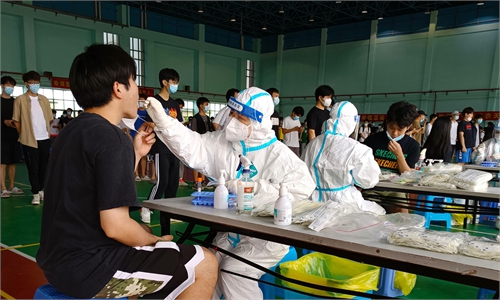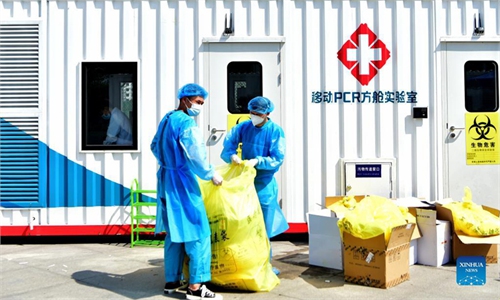IN-DEPTH / IN-DEPTH
Plastic film recycling system contributes to sustainable agricultural devt in SW China's Yunnan
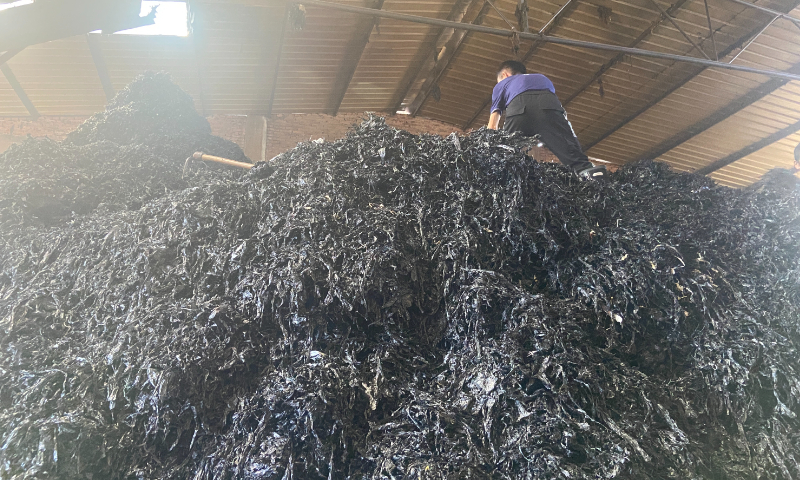
A worker is processing the black film waste at a factory in Qujing. Photo: Xie Wenting/GT
"I've been using plastic film since I started growing flue-cured tobacco. In the past, the waste plastic film was discarded in the farmland and the river, which presented a shocking scene. We all knew this was bad for the environment but we did not know how to deal with it," Dong Xuekun a farmer and director in a tobacco specialized farmer cooperative in Qujing, Southwest China's Yunnan Province, told the Global Times.
Ever since the plastic film was introduced in China and became widely used in the agricultural industry, it has not only boosted agricultural production, but also caused large-scale pollution. This is a type of serious white pollution as the used bits of film would just be ignored by farmers, with most of it being allowed to rot in the farmland or thrown into rivers, harming the environment and posing potential risks to human health.
To address the issue and build a clean and safe agricultural environment, Qujing municipal government in 2014 launched a program featuring recycling and reuse of plastic film. Local farmer cooperatives and a recycling company named Yunnan Qujing Plastics Group were mobilized in the process of recycling waste plastic film.
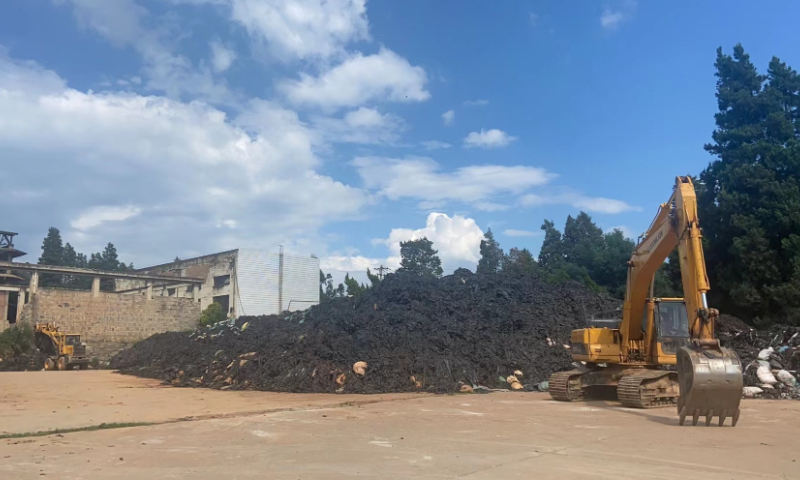
A pile of black film waste at a recycling site in Qujing, Southwest China's Yunnan Province Photo: Xie Wenting/GT
At one recycling site, the Global Times reporter saw hundreds of tons of black waste plastic film was put into containers and stacked neatly under a plastic steel shed.
Dong explained that after the autumn harvest, the focus of their work shifts to picking up and recycling waste plastic film. Farmers now have strong motivation to get involved because they get "paid" for recycling.
In Dong's cooperative, there are more than 800 households, who plant more than 10,000 mu (666.67 hectares) of flue-cured tobacco and use nearly 100 tons of plastic film every year. The cooperative signed an agreement with the local tobacco company as well as Qujing Plastics Group. For every kilogram of waste plastic film recycled, the tobacco company will pay the farmers 2 yuan ($0.29), and the Qujing Plastics Group will pay the cooperative 1 yuan as the acquisition fee.
"Through continuous practice, we have set up a zero-emission residual film recycling and treatment system, established two 10,000-ton residual film treatment plants, and obtained 15 new invention patents. Since 2014, we have recovered more than 80,000 tons of waste film, realized the production and application of about 20,000 tons of recycled material, and cleaned about 1.5 million mu of farmland every year," Lu Bin, general manager of the Qujing Plastics Group told the Global Times.
A member of Dong's cooperative told the Global Times that the waste film recycling job has a great impact on the yield and quality of flue-cured tobacco. "In recent years, we have continued to carry out waste film recycling work and one mu of land can 'yield' about 10 kilograms of waste film. Therefore, the tobacco planting environment has been gradually improved, the quantity and quality of tobacco leaf have also improved, which greatly increased our income," he said.
Analysts pointed out that agricultural film has been used in China for nearly 50 years. As the waste film is generally not recycled, it is discarded by farmers which pollutes water and blocks river channels, seriously harming the sustainability of agriculture. While sustained development is a common issue across the country, the recycling and utilization of waste film is a different problem in different places, and it is difficult to have it solved by one company or city.
"Qujing firmly adheres to the concept of green development. Through a series of measures in recycling waste film, our environment has been greatly improved. Now the river is clearer and the land is tidier," said Zou Yukun, deputy director of local affairs bureau of Qujing economic and technological development zone.
But Zou noted that this model is not easy to emulate for other provinces. "Yunnan is a big tobacco-producing province. Tobacco is grown on more than half of the province's land. To solve the problem of waste film recycling, both the Qujing Plastic Group and local tobacco companies have invested heavily in the current recycling model. This model is hard to replicate in other provinces," Zou said.
Analysts noted that motivating farmers in the recycling process is very important and it needs governmental organization to step up efforts to subsidy farmers in the recycling process.
For the recycled waste film, at one recycling site, the Global Times reporter saw the area about the size of a football field is filled with a hill of black film waste. A forklift shuttles back and forth, feeding the waste film into a crusher. Then through the processes of rinsing, squeezing, breaking up, air conveying, plasticizing, water-cooling pelletizing, dehydration, packaging, and other processes, the waste film becomes agricultural film recycled material.
"There is no garbage that cannot be disposed of, only resources that are not well designed and utilized. The key lies in how we design products, how to use products, and how to recycle products. Through the construction of the entire recycling system, we have found that the entire society has an urgent need for waste film recycling as well as efficient processing of waste film to produce new recycled materials. We also hope that through everyone's unremitting efforts, the sustainable development of agriculture can be achieved," Lu said.
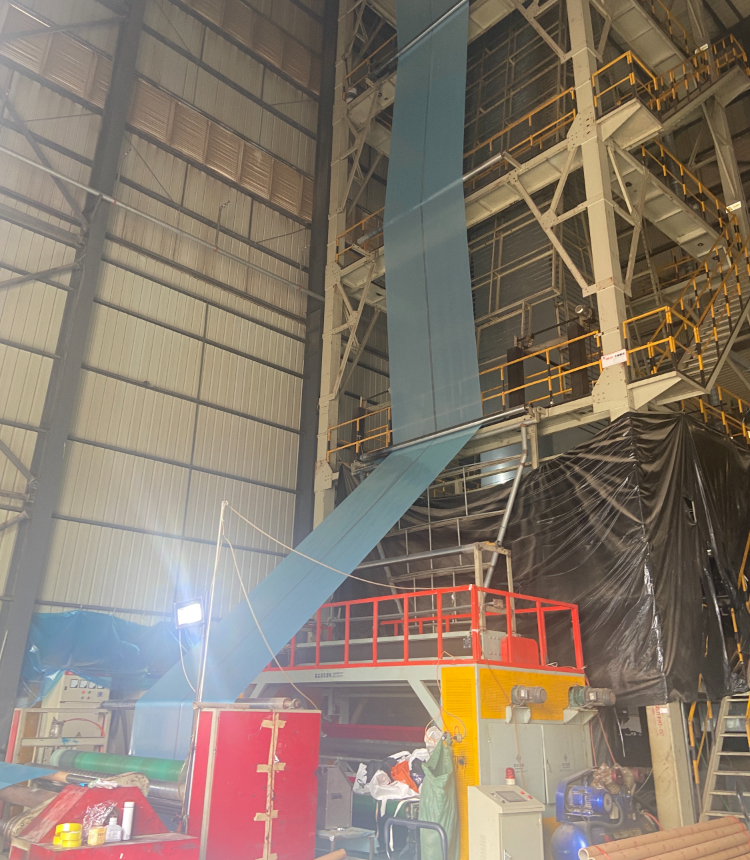
A film product used in agricultural industry Photo: Xie Wenting/GT
